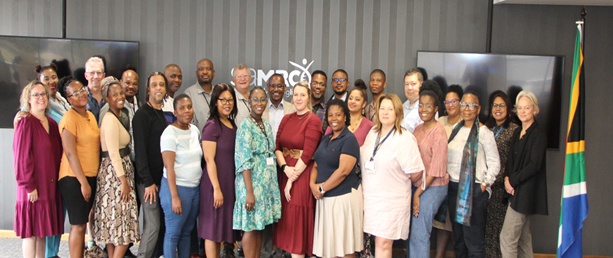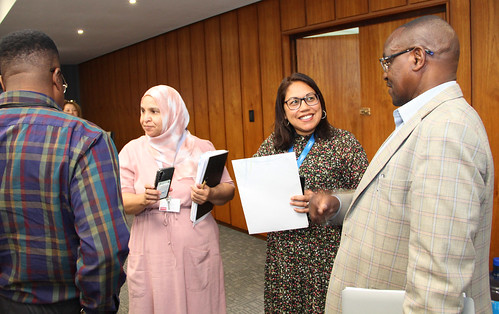SAMRC hosts the SA-UK DHET Doctoral Training Programme Delegation to boost Staff Capacity Development at Historically Disadvantaged Institutions
In the continuous effort to strengthen research capacity at selected Historically Disadvantaged Institutions (HDIs), the South African Medical Research Council's (SAMRC) Research Capacity Development (RCD) division recently hosted a delegation from the SA-UK DHET Doctoral Training Programme to capacitate academic staff members at HDIs. This collaborative programme is co-funded by the University Staff Doctoral Programme (USDP) Phase 2 implemented by the Department of Higher Education and Training to increase the number of doctorally qualified staff at South African Universities and the British Council. It marks a significant stride in empowering academic professionals from HDIs. The 22 faculty staff members were from HDIs, namely, Sefako Makgatho University (SMU), University of Fort Hare (UFH), Walter Sisulu University (WSU) as well as the University of Stirling (UoS, UK) and University of Cape Town (UCT).

The visit was initiated by Professor Alison September, a beneficiary of the SAMRC Mid-Career Scientist Programme at UCT, and one of the supervisors in the SA-UK DHET Doctoral Training Programme leading the PhD training in South Africa; guiding 10 university staff from previous HDIs to obtain their PhDs. The primary objective of this engagement was to explore grant funding opportunities provided by the SAMRC and how SAMRC can be involved in the SA-UK/DHET HDI Partnership programme.
Dr Michelle Mulder, the Executive Director of Grants, Innovation, and Product Development (GIPD) and Research Capacity Development (RCD) extended a warm welcome to the guests. She provided a strategic overview of SAMRC grant and career development opportunities available for HDIs, along with essential guidelines for prospective applicants. Dr Marlon Cerf, a senior programme manager from GIPD, and Dr Frederic Nduhirabandi, the programme manager of the RCD Career Awards, elaborated on the SAMRC grant opportunities, demonstrating diverse funding avenues and research prospects that resonated well with the visiting academic delegation.
As part of the engagement, the 10 doctoral students participating in the programme presented their study topics and objectives, providing a platform to share their research and explore potential areas of collaboration with SAMRC. In this regard, three Unit Deputy-Directors, Professors Rabia Johnson, and Carmen Pheiffer from the Biomedical Research Innovation Platform (BRIP) and Dr Duduzile Ndwandwe (Cochrane) also joined the meeting. One of the supervisors, Professor Apalata, highlighted that the programme attracted four clinicians (40%) of the academics studying towards their PhD. He further pointed out that the programme also involves past RCD beneficiaries and principal investigators of the first cohort of SAMRC Research Capacity Development Initiative (RCDI) as supervisors, including himself, Professor Mapaseka Seheri, and Professor Eunice Seekoe, highlighting the long-term impact of RCDI funding at selected HDIs. Furthermore, the discussion highlighted the importance of staff who are studying having time for their research, through sabbatical leave and lecturer replacement; support for research projects; the need for mentorship in grant applications; and the benefits of having research equipment at HDIs.
Professor Mzikazi Nduna, Dean of the Faculty of Health Sciences at UFH, emphasized the benefits of the programme at an institutional level, underlining the commitment of the academic leadership to this collaborative initiative. Professor Seekoe, who is also an SAMRC board member, highlighted the programme's role in strengthening capacity development of HDIs and the need for increased support to raise the number of academics with PhDs.
Concluding the meeting, Dr Abeda Dawood, RCD Divisional Manager, underscored the importance of collaboration, stating, "The SA-UK DHET Doctoral Training Programme's involvement, and the participation of past SAMRC beneficiaries, reflects the impact of SAMRC funding. This visit provided a tangible platform for staff from HDIs to gain valuable insights into grant funding opportunities and the tools necessary to enhance their research capacity to attract SAMRC support for their collaborative efforts”.
Contributors: Research Capacity Development Division (abeda.dawood@mrc.ac.za)

